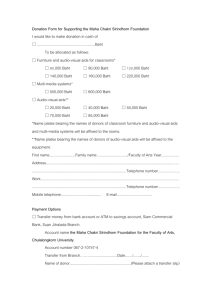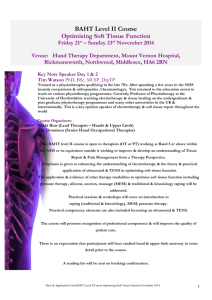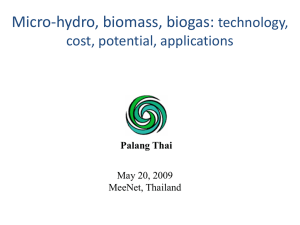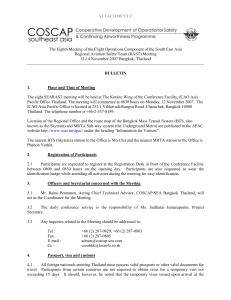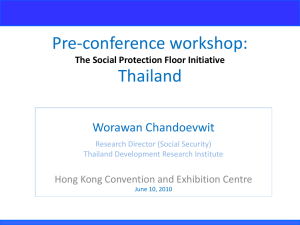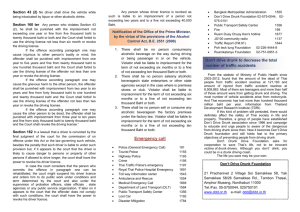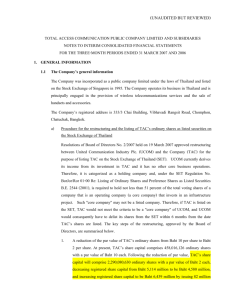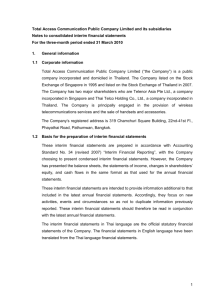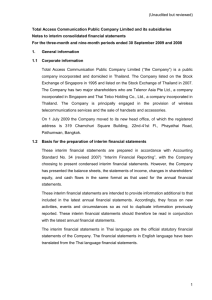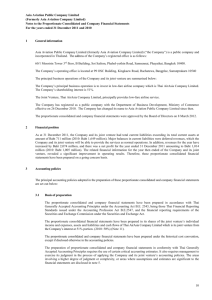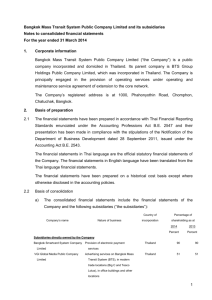STUDENT REPORT FROM THAILAND Name of the University
advertisement
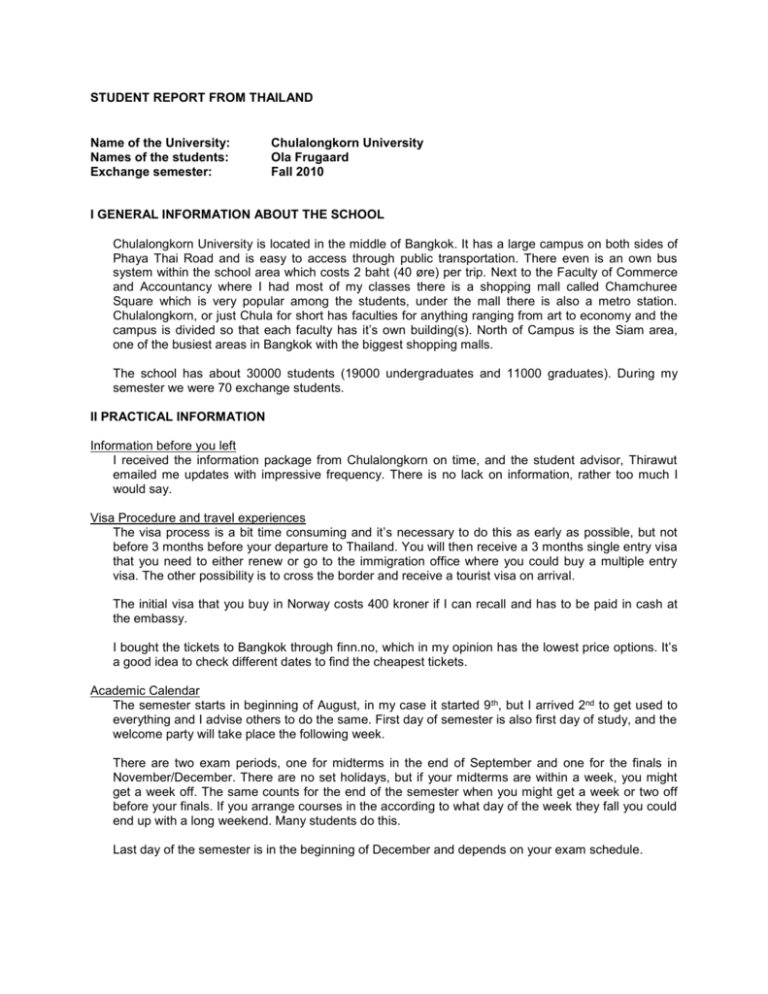
STUDENT REPORT FROM THAILAND Name of the University: Names of the students: Exchange semester: Chulalongkorn University Ola Frugaard Fall 2010 I GENERAL INFORMATION ABOUT THE SCHOOL Chulalongkorn University is located in the middle of Bangkok. It has a large campus on both sides of Phaya Thai Road and is easy to access through public transportation. There even is an own bus system within the school area which costs 2 baht (40 øre) per trip. Next to the Faculty of Commerce and Accountancy where I had most of my classes there is a shopping mall called Chamchuree Square which is very popular among the students, under the mall there is also a metro station. Chulalongkorn, or just Chula for short has faculties for anything ranging from art to economy and the campus is divided so that each faculty has it’s own building(s). North of Campus is the Siam area, one of the busiest areas in Bangkok with the biggest shopping malls. The school has about 30000 students (19000 undergraduates and 11000 graduates). During my semester we were 70 exchange students. II PRACTICAL INFORMATION Information before you left I received the information package from Chulalongkorn on time, and the student advisor, Thirawut emailed me updates with impressive frequency. There is no lack on information, rather too much I would say. Visa Procedure and travel experiences The visa process is a bit time consuming and it’s necessary to do this as early as possible, but not before 3 months before your departure to Thailand. You will then receive a 3 months single entry visa that you need to either renew or go to the immigration office where you could buy a multiple entry visa. The other possibility is to cross the border and receive a tourist visa on arrival. The initial visa that you buy in Norway costs 400 kroner if I can recall and has to be paid in cash at the embassy. I bought the tickets to Bangkok through finn.no, which in my opinion has the lowest price options. It’s a good idea to check different dates to find the cheapest tickets. Academic Calendar The semester starts in beginning of August, in my case it started 9 th, but I arrived 2nd to get used to everything and I advise others to do the same. First day of semester is also first day of study, and the welcome party will take place the following week. There are two exam periods, one for midterms in the end of September and one for the finals in November/December. There are no set holidays, but if your midterms are within a week, you might get a week off. The same counts for the end of the semester when you might get a week or two off before your finals. If you arrange courses in the according to what day of the week they fall you could end up with a long weekend. Many students do this. Last day of the semester is in the beginning of December and depends on your exam schedule. Reception The reception at school is over all expectations and everyone is very welcoming, the Thai students tend to be a bit shy in the beginning, but if you take the initiative and seek contact them, they will not hold back. The administration at the BBA office will know your name and your origin by the second time you meet them, and they are very easy going and social. They will also help you with everything, and if you have a problem, you will leave the office without one. Housing The BBA office has contact with two serviced apartment buildings, where most of the student lives in hotel like environment. This is Chong Nonsi Residence and Evergreen Residence. Both places have swimming pool, gym and cleaning girls. At Chong Nonsi you live in apartments for two and have your own bedroom, while at Evergreen you stay 4 in one apartment, and two and two have to share bedroom. Evergreen however is more central, where most of the exchange students live. The BBA office will support you with the rest of the information. To stay at Evergreen cost you 10000 baht a month (40000 baht for the whole apartment). I myself wanted something even more luxurious and rented a condo just up the road from Evergreen in a condominium called Villa Rachatewi. For 26000 baht (4800 kroner) I got a 60 sq. meter apartment on the 26th floor, with awesome view of the city. The building is brand new and also has a swimming pool and a gym on the 7th floor. Porters will help you get in and out of the building and the security and service is top notch. There are tons of these condominiums in Bangkok and at prakard.com you will probably find the cheapest deals, even though most of the ads are in Thai. Costs The cost of living in Thailand is insanely low, books is about 500 baht each (100kr). Even though the exchange rate now is at 5,4, I will use a rate of 5 here. A meal in the school canteen is about 20-30 baht (4-6kr), this will make you more than full. If however you want some more exclusive food, you could go the mall and pay between 50-150 baht for some good food, most of the restaurants there is Japanese or fusion. Food elsewhere is so cheap that you will never have to cook yourself. There is restaurants all along most streets (street food is extremely popular in Thailand) and it will cost you 40200 baht per dish. International restaurants are a lot more expensive, but still cheaper than in Norway. Also McDonalds is quite expensive for Thais, but at 120 baht, or just over 20 kr for a Big Mac menu, it’s still cheap. Thai’s like to drink whiskey, and when they go out they usually buy a bottle to share, and buy mixers on the side. A bottle of whiskey would cost 300 baht for the local, 450 baht for 100 pipers, which is the cheap, but still good scotch and 1000-3000 baht for the different blends of Johnny Walker, the most popular in the upmarket nightclubs. A big bottle of beer starts at 60 baht in restaurants and bars, but in nightclubs it could be 200 baht just for a small bottle. Because Bangkok is such a big city, you will have to use transportation to get most places. The traffic is furious most of the day time, but there is easier way to get around. The BTS Skytrain has two line and cost from 15-40 baht per trip. The MRT Subway has one line and cost between 20-40 baht per trip. If you are more than 2 persons, it is usually cheaper with a taxi meter, which starts at 35 baht, and get you around most off the city for less than 100 baht. In the morning and evening you it is nearly impossible to get around this way though. A bit more dangerous, but faster way to get around is with a motorbike taxi. They are a bit more expensive than a taxi, but can get through traffic a lot faster. If you are late for school, it’s a good alternative. There are also tons of buses, but they are even slower. A bus with fan is sometimes free of charge, or costs a max of 8 baht. Air conditioned buses costs between 11 and 25 baht per trip. TUK-TUKs are a bit faster than taxis, but many of the drivers will try to rip you off, don`t get into one of the without agreeing a price in advance. They are usually a bit more expensive than taxis. Shopping is a big hobby for many Thais it seems, and you can find things to buy everywhere. Some places you need to bargain hard, while other places it`s not usual to do so. Try not to shop too much at places with a lot of tourists, because there the prices are naturally put higher. Shops around Khao San Road can be cheap though. The weekend market, Chatuchak is one of my favorites. Here you can find anything and the prices are not too bad. Some shops you can bargain some, while in other shops you cannot. For girls, Platinum fashion mall is a big hit, there are hundreds of small shops there and the prices aren`t bad. The upmarket shopping malls like Central World and especially Paragon is for the rich, or HI-SO`s as the they are called in Thai. Prices here are mostly on the same level as in Europe. Other markets not to miss are the night market at Saphan Pud, and the gaming market at Saphan Lek. MBK is the most popular shopping mall among tourists, but here it`s easy to get tricked, and the prices are almost always higher for foreigners. Pantip is the big IT-mall in Bangkok. Here you can get all electronics and contrabands, but some sellers are a bit aggressive. Expect from the contrabands, there is not much to save on brand named electronics. While in Thailand it`s essential to travel around the country. Best way to get around is by bus or plane. AirAsia is definitely the cheapest airline. A bus ride to the southern part of the country, like Krabi is around 500 baht, and to the islands on the eastern cost you will need to pay about 150-300 baht depending on the class of the bus. VIP is the best class, with good seats and TVs. The basic bungalows could go from anything between 300 and 1500 baht depending on the season and the location. The International Office There is a BBA office at the faculty of Commerce and Accountancy. It`s open from 08.00 to 17.00 Monday to Friday. There is several persons working there to assist you, Thirawut Sutabut is the contact person for the incoming exchange students. If there is anything you want information about just ask there. Exchange promotion At the welcome party all incoming students will be asked to make a presentation on stage about your country and university. Social Activities The relationship you get with the other exchange students is truly amazing. You get to know people from all over the world. There was not any special ‘click’ among the students so everyone hang out with anyone. We often went out eating, drinking or traveling together. You are free to join organizations at school such as football, aerobics and other cultural things. Not many exchange students attended this kind of things as far as I know, but we arranged a football match against the Thai students which was quite fun. At school we used a lot of time to discuss theory and cases. This is not so normal Norway, but I liked it a lot. Most of the professors at school are really nice, and some of them were not afraid of sitting down with you for lunch. One professor even invited his class for an evening with winetasting and socializing at a 5 star hotel. Culture and Language Everything related to school will be in English so language is not a problem at school. However, when going to a market or trying to tell the taxi driver where to go, language could be a problem. Trying to learn some basic Thai words will make this a bit easier. Body language is universal, and if you try to pick up things as you move along language will not be a big problem for you. Thais are very helpful and will try to do as best they can to make you happy. The culture will be around you all the time. Bangkok is called City of Life and on every corner there`s something to look at. The city is vibrating 24/7 and you can do whatever whenever. If you really want to experience culture, I suggest you get to know someone who live outside the city and is willing to let you come and stay with them for a few nights. Cultural and Social Effects from the Exchange Experience The exchange has definitely affected the way I think in many situations. First of all I have learnt how to deal with a different culture on a daily basis. To live in Thailand, you get a deep understanding of why people act in a certain way. I also started to notice what I like and not about Norway. All in all, I like the way life in Thailand makes you interact with other people in so many occasions. I believe companies, especially the once with international interests is interested in students who have done an exchange semester. I have always wanted to work in an international environment and that hasn`t change after this semester. III ACADEMIC INFORMATION The Teaching situation All the teaching is done in English which is fluently spoken by professors and students. Compared to BI there is more case work and presentations. The final exams are usually not counting more than 25-30 %. This makes you work more evenly throughout the semester rather than just the last two weeks before the exam. Teaching is as much practical as theoretical and perhaps not as academic as at BI. The cases and presentations will be done in groups, so pick a good group to work with early. There`s usually a lot of humor and goodwill in the classroom, so don`t be scared to take the word. Required Literature The literature is in English and on pair with the one you find in Norway. In some classes, handouts are the only required literature though. Exams There is both midterm and final exams, where the curriculum is split in two. Exams could be both written or given as a multiple choice. Just by attending classes one should be able to pass the exam. Other The library is easy to access and open for exchange students, but you need to login before entering. Same counts for the computer rooms. Remember to wear full uniform when going to the library. All information from school will be sent by mail, so there are no use for IT programs such as itslearning. Description of Courses Please list all the courses you are taking in the form below: International Economics Course number: 2604472 Prerequisite: 2900112 Exam form: Written. This course is relevant for those who want to get a deeper knowledge of how international markets intervene. It`s in many ways a mix between micro economics and international macroeconomics. It`s one of the harder subjects, but also interesting. Business Strategy Course number: 2602416 Prerequisite: This is a senior year subject. Normally students will need to have completed all basic core courses. Exam form: Written Interesting subject that is based on the strategy of new business ventures. A lot of the work is done by case works and discussion in class. It`s relevant for those interested in innovation and how to organize new projects for companies. Marketing Strategy Course number: 2605425 Prerequisite: Basic marketing Exam form: Written This course is basically about how marketing is used practically. There will be a lot of cases on how to market products locally and internationally. There is a strong focus in how to build a brand, both existing and new ones. Entrepreneurship Course number: 2602417 Prerequisite: None Exam form: Written, business venture This is a straight forward course about entrepreneurship. It`s really popular and almost 100 students attended my class. Professor (Ajarn) Chavapas has some really good connections with Thai entrepreneurs. We had guest speakers coming to almost every lesson. You will also have a midterm exam which is based on making a business venture, where you have 6 hrs to sell your product. You will start up with 1000 baht, and whoever gets the most money gets the best grade. My group came second and we made 13000 baht in 6 hrs. Names and e-mails: Ola Frugaard ola.frugaard@hotmail.com

